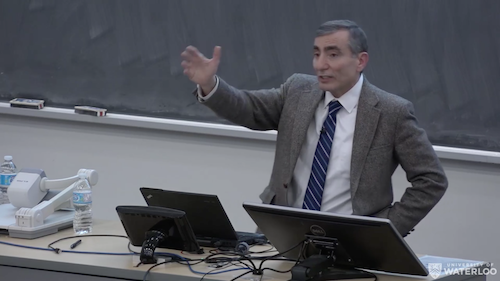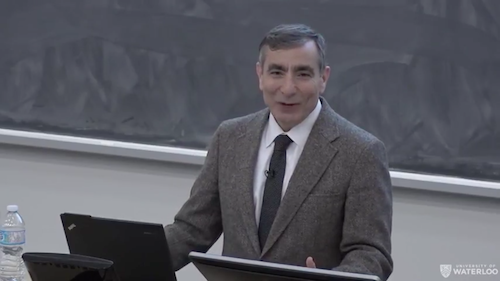 Evolution
Evolution
 Life Sciences
Life Sciences
From Atheist Jeffrey Shallit, a Telling Response on the Origin of Life
Jeffrey Shallit is a computer scientist at the University of Waterloo whom we’ve dealt with here on occasion before. When I heard that Rice University organic chemist James Tour (above) had visited Shallit’s campus back in March to deliver the 2016 Pascal Lectures on Christianity and the University, I was curious. The most interesting of three talks was “The Origin of Life: An Inside Story.” Would Jeffrey sit in and comment?
He (Shallit) did indeed write in anticipation of the event (“that annual embarrassment at the University of Waterloo”), blasting Tour (a more distinguished scholar than himself) and the University of Waterloo for inviting him to speak, and citing University of Toronto biochemist Larry Moran. Professor Moran for his part had previously dismissed Tour for speaking out on evolution (he’s a signer of the Dissent from Darwin list) when Tour is not, in fact, an evolutionary biologist.
Moran:
I could put up a blog post saying that I have nothing substantive to say about cosmology or organic synthesis. Why would anyone care about that?
Did Shallit attend the OOL lecture? I’m not sure. He only writes about a second talk Tour delivered, “The Nanotechnologist & God” — not on the origin of life but primarily concerning Tour’s Christian religious beliefs. For these, you guessed it, Shallit blasts him:
I did get a chance to ask a question. After hearing this litany of successes that Prof. Tour had achieved through prayer, I asked him what percentage of things he prays for don’t come true. He was unable to provide a figure. This is compartmentalization again. A scientist would, I would think, want to know this important fact. Do certain kinds of prayers work better than others? Does the time of day affect success? Is success actually greater than chance, or does Prof. Tour simply forget about the prayers that don’t come true? Does it help if the prayer is said in certain languages? Are prayers for oneself granted more often than prayers for others? What happens when two equally virtuous people pray for opposite outcomes?
That’s right, Shallit is disappointed that Tour isn’t so vulgar as to slap a success ratio on his prayer life, as if someone so crass could be expected to have a meaningful prayer life to begin with, or as if Shallit’s crude picture of prayer (basically, free stuff) were itself genuine. If Shallit is married, has a family, or if he has any friends, I wonder if he would consider subjecting his relationships with these loved ones to the kind of analysis he thinks Tour should subject his relationship with God.
Anyway, click on the image at the top to see the technical talk. The religious one is here:
But this I find very telling. Moran and Shallit previously criticized Tour for expressing an opinion about evolution, when he is chemist not a biologist. But now he delivers a quite provocative lecture on a subject well within the ambit of his expertise — prebiotic chemical evolution, that is, the challenge of explaining abiogenesis, life from nonlife.
Tour is very impressive, on fire at times, tearing apart claims that science has any idea how life first arose. He warns the audience that he will not be talking about philosophy at all, only science, in fact only chemistry, and that the lecture will be “painfully technical,” so much so that he wouldn’t blame anyone if they walked out: “I simply know of no other way to expose the hypocrisy of the conjectures based on the evidence.”
Whoa. Full of fighting indignation, he lashes those in his field who imagine they are anything but “clueless” as to the mystery of life’s origin.
These atheists want Tour to talk about his own scientific field. But when he does, what do we get in response? Either they talk about religion, or they go silent. That is, the response is no response.
Images: James Tour courtesy of University of Waterloo, via YouTube.


